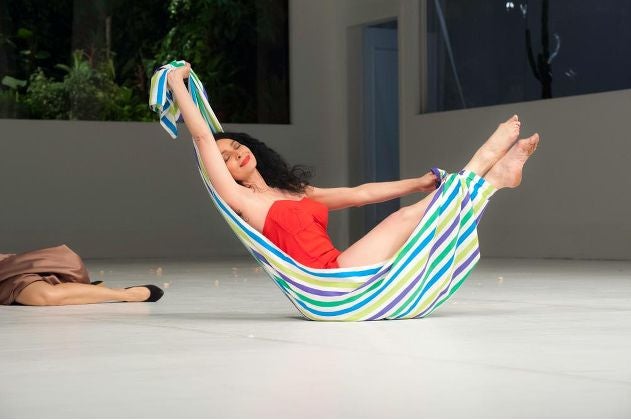Two Cigarettes in the Dark, Pina Bausch, Tanztheater Wuppertal, Sadler’s Wells, London

Your support helps us to tell the story
From reproductive rights to climate change to Big Tech, The Independent is on the ground when the story is developing. Whether it's investigating the financials of Elon Musk's pro-Trump PAC or producing our latest documentary, 'The A Word', which shines a light on the American women fighting for reproductive rights, we know how important it is to parse out the facts from the messaging.
At such a critical moment in US history, we need reporters on the ground. Your donation allows us to keep sending journalists to speak to both sides of the story.
The Independent is trusted by Americans across the entire political spectrum. And unlike many other quality news outlets, we choose not to lock Americans out of our reporting and analysis with paywalls. We believe quality journalism should be available to everyone, paid for by those who can afford it.
Your support makes all the difference.If the phrase “rarely performed work” sets off warning bells, hearing that it explores the monotony of existence has them clanging. Pina Bausch was one of the most influential choreographers of the twentieth century, creating onstage worlds of surreal images and human need. Two Cigarettes in the Dark, which opens a London season by Bausch’s own company, has her usual themes without her best insights. It’s a long, long evening.
Peter Pabst’s stark white set is boxed in to create a space smaller than the stage, with closed-off rooms at the edges. The back wall has a window onto a brightly-lit jungle. One side has a wall of fish tanks with real fish.
The usual cast of Bausch people totter in: women in long dresses and killer heels, men in suits. They quarrel in several languages, speak to the audience or smirk out at us, repeat obsessive patterns of behaviour or just mooch about. The soundtrack is a jumble of classical music and 1940s songs. Bausch’s works are often monumentally long, but Two Cigarettes in the Dark is horribly slow. Action and ideas are spread thin.
As Helena Pikon lurches about the stage, swinging her hair, a man brings a log on stage, turns it upright and stands on it, holding a teacup. When she moves behind his log, a second man catches her and forcibly changes her cream silk dress for red tulle.
When someone spills a puddle of alcohol onstage, another man drags a woman in and blames her for it, as if he were angrily house-training a puppy. Messy male-female relationships are a Bausch speciality; her works are full of casual cruelties and humiliations. This feels like a choreographer repeating herself.
A few scenes stand out. Aida Vainieri comes on in a 1950s swimsuit, carrying a striped towel. She lies down on it, then pulls it into a hammock shape. She snuggles happily, eyes blissfully closed, even though she’s the one holding herself up. The whole cast rock on the floor to Ravel’s La Valse, scrambling in a wild seated shuffle. Two women look out at the audience, reciting prices while thrusting a hip or a breast. After a long pause, one says witheringly, “It’s the interval.”
Some scenes look dangerous, including a chase with an axe and some precarious balancing on logs or planks. Dominique Mercy puts on flippers to splash through the fish tank, as a colleague shouts abuse from the stage. I feel sorry for the fish.
Until 17 February. Box office 0844 412 4300
Join our commenting forum
Join thought-provoking conversations, follow other Independent readers and see their replies
Comments